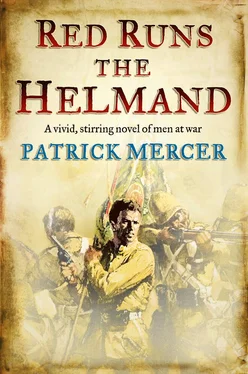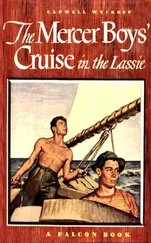PATRICK MERCER
Red Runs the Helmand

To my wife, Cait.
This is the third and final book in the Anthony Morgan trilogy: I will miss him and his friends. I would like to thank my wife, Cait, who has heard every word of this book more times than she cares to remember, my son, Rupert, and the staff of the 66th Regiment’s Museum in Salisbury. I canot forget Sue Gray and Edward Barker for their patience and forebearing and, of course, my agent, Natasha Fairweather of AP Watt and my faultless editor, Susan Watt.
Skegby, February 2011
Contents
Cover
Title Page PATRICK MERCER Red Runs the Helmand
Epigraph This is the third and final book in the Anthony Morgan trilogy: I will miss him and his friends. I would like to thank my wife, Cait, who has heard every word of this book more times than she cares to remember, my son, Rupert, and the staff of the 66th Regiment’s Museum in Salisbury. I canot forget Sue Gray and Edward Barker for their patience and forebearing and, of course, my agent, Natasha Fairweather of AP Watt and my faultless editor, Susan Watt. Skegby, February 2011
Author’s Note
Chapter One - Kandahar
Chapter Two - The Ghazi
Chapter Three - Khusk-i-Nakud
Chapter Four - The March
Chapter Five - Gereshk
Chapter Six - Eve of Battle
Chapter Seven - Maiwand, Morning
Chapter Eight - Maiwand, Afternoon
Chapter Nine - Retreat
Chapter Ten - The Siege
Chapter Eleven - The Sortie
Chapter Twelve - The Battle of Kandahar
Glossary
Historical Note
Also by PATRICK MERCER
Copyright
About the Publisher Конец ознакомительного фрагмента. Текст предоставлен ООО «ЛитРес». Прочитайте эту книгу целиком, купив полную легальную версию на ЛитРес. Безопасно оплатить книгу можно банковской картой Visa, MasterCard, Maestro, со счета мобильного телефона, с платежного терминала, в салоне МТС или Связной, через PayPal, WebMoney, Яндекс.Деньги, QIWI Кошелек, бонусными картами или другим удобным Вам способом.
Author’s Note
I’m amazed that anyone can soldier in Afghanistan at all. During several recent visits to that country I have found the heat almost unbearable and the ground unforgiving. Today’s soldiers have the advantage of wheeled and air transport (well, some of the time) but much of their fighting is done on foot burdened with personal loads of electronic equipment, body armour, helmets and the like that would have horrified their predecessors.
Most remarkably, though, the soldier of 1880, while carrying much less kit, survived on a fraction of the water that his great-great-grandson does. It’s noticeable how much logistic effort in the Helmand valley today is absorbed by the carrying forward of potable water – an effort that is directly equivalent to that needed for animal fodder in the 1880s. It has taken me some time to understand the priorities of an army in the field in the nineteenth century and the different privations they suffered.
Another challenge has been to grasp how the relationship between officers and men in the Indian armies actually worked. I’ve modelled this on the modern Gurkha troops alongside whom I served and the way that their British officers communicated with them. Nowadays, officers in Gurkha regiments have to pass exams in the language of their men. While a similar system was in its infancy at the time of Maiwand, British officers would have been surrounded by native dialects both on and off duty and this, I have no doubt, would have encouraged them to learn the language. But imagine how difficult communications would have been between, say, the 66th and Jacob’s Rifles; I’ve tried to capture some of this friction.
The language of my British characters, for obvious reasons, lacks the casual racism of the later nineteenth century, but I’ve tried to reflect the humour, candour and pragmatism of the time. In the same way, I believe that relationships then between officers and men in the British Regular Army were very similar to those of today. The film industry is, perhaps, most to blame for the impression that Victorian officers treated their men with a stiff, unbending formality but contemporary diaries and letters would utterly refute that. So, I’ve taken the heartbeat of the men with whom I served a hundred years later and sprinkled the way in which they spoke and joked with the military patois of imperial times; I hope I’ve got it right.
Anthony Morgan has now fought in the Crimea, the great Mutiny and the Second Afghan War, fearing much, slaughtering many and seeing more horrors than ten men. I’ve visited the home of the real Morgan in a delightful corner of County Cork and been treated with great courtesy by his descendants. It was there that Anthony actually retired to raise a family, pursue foxes and all other forms of wildlife and have a walk-on part in the Somerville and Ross books. I suspect that it is now time to let the fictional character enjoy some of the same.
Last, I’ve taken advice on almost everything in this book. If something is obscure, not covered in the glossary or just plain wrong, then it is entirely my own fault.
Patrick Mercer
Skegby
Nottinghamshire
Chapter One - Kandahar
‘No, Havildar, turn out the bloody guard, won’t you? I don’t want these two men standing there like goddamn sacks of straw. Just turn out the guard!’
I never could get my tongue round Hindi. It was all very well cussing native troops, but if they really couldn’t understand anything beyond the fact that you were infuriated with them, what was the point? In my experience, the angrier a sahib got them, the more inert and immobile they became. It was the middle of March 1860 and I’d only arrived in Kandahar after a long journey from India forty-eight hours before. And what a hole it was. The surrounding country was what I’d expected, all mountains, vertical passes and twisting, gritty roads; there was a rough beauty about it after the stifling lowlands of India. But the old city was not what I’d imagined at all. For a start, it was so much smaller than I’d thought. True, shacks, mud-built slums and thatched huts sprawled around outside the wall of the place, but the town itself wasn’t much bigger than Cork, yet it was packed twice as tight and smelt three times as bad.
Now, this little fracas at the gate came at the end of a long day when Heath, my brigade major, had proved to be even more useless than I’d thought. We’d been all round the units of my brigade, some of which were still dragging themselves into the town after the long march up from Quetta, although most of them had now arrived. I’d thought the Sappers and Miners’ horses slovenly – girths loose and fodder badly stowed. I’d found rust on more than one entrenching tool of the 19th Bombay and now, as I approached the Shikapur, or south, Gate of the city, Jacob’s Rifles – who had been the first to arrive and were meant to be finding the city guard – failed to recognise their own brigade commander. And what was that clown, Heath, doing about it? Was he chasing and biting the NCO in charge? No, I had to do it my-bloody-self.
Читать дальше













